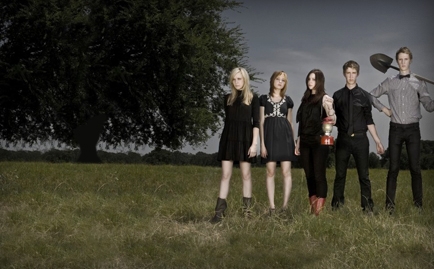In the Greek myths about creation and how evil entered into the world, a tale is told about a woman named Pandora, who was given a box. This box contained all the evil in the universe—all the brokenness, the bad things, natural disasters, terrible human will. Everything. As the story goes, Pandora became too curious and opened the box—and once the box was open, there was no closing it again.
For the ancient Greeks, the fact that evil existed in the world was the woman’s fault.
In the familiar Hebrew creation story in Genesis, the fall of man began with Eve, and continued when Adam sinned with her. Both were punished and sent away from the Garden of Eden, with Eve saddled with the full burden of procreation and pain of childbirth, and Adam forced to work for his food.
It is both of these stories that inform the world that surrounds Jesus’ time. And it is because of these kinds of stories that women had a very hard time in the ancient world. They were property, exchanged by their fathers for land or animals, in a way of making good business deals. They often had to share their husband with many other wives (Solomon, most famously had more than 100 wives). If a divorce occurred, the woman was bound to be worse off. She would often be unable to find a way to make money, and because she was no longer a virgin, she would be considered an adultress if she married another man. She could not inherit property—all property went to the sons, not the daughters. And Lord help her if she was ever raped at a young age. Non-virgins, considered impure, were virtually impossible to marry off, and the woman had almost no recourse against her attacker.
Basically, in Jesus’ time, a woman had no standing, no real identity for herself, and was extremely oppressed. And for a very long time afterward, things have remained the same. Milton wrote his epic poem Paradise Lost, which blamed Eve for everything, saying Adam had basically no part in the Fall. Up until the 19th century, women were still largely regarded as property. Up until the 20th century, women couldn’t vote to contribute to the political discourse in this country. Two-hundred years ago, I probably would have had to have a man publish this article under his name in order for it to have any legitimacy—or, at the very least, I would have needed a man’s stamp of approval.
Women today are still fighting in many parts of the world for their rights to their own identities, to not to be sold as a slave. They fight for rights to own property, to speak up in the political discourse of the day, to make choices about whether or not to work outside the home or to stay in and raise the children. In America, women are still striving to be paid the same as men for equal work (the most recent statistics place the amount at 77 cents to a man’s one dollar).
To date, you would be hard-pressed to find a people group who has so consistently been oppressed across cultures and across history. And it’s utterly remarkable to examine the treatment of women in light of how God chooses to use women in the Bible.
I give you Matthew 27.
In verses 55 and 56, it reads: “Many women were there, watching from a distance. They had followed Jesus from Galilee to care for his needs. Among them were Mary Magdalene, Mary the mother of James and Joseph, and the mother of Zebedee’s sons.”
This directly follows the Roman guards’ exclamation that Jesus is the Son of God, shortly after the ripping of the curtain in the Temple. In other words, the mention of women waiting and watching the death of Jesus follows shortly after a great display of power from God. You would think His disciples would be the ones mentioned, but it is women who hold the honor of watching the death of Jesus to the very end, women who were brave enough to stay and witness the power of God.
Women are worth a mention.
Just a couple short verses later, we read, “Mary Magdalene and the other Mary were sitting there opposite the tomb” (verse 61). Again, it is the women who are waiting. The disciples are nowhere to be seen; they have already moved on. They’ve basically given up and gone into mourning elsewhere. But the women—the women stayed and watched and mourned there at the tomb.
Women are worth a mention again.
The next, and most powerful reference to women comes in the next chapter, verses 5-10:
The angel said to the women, “Do not be afraid, for I know that you are looking for Jesus, who was crucified. He is not here; he has risen, just as he said. Come and see the place where he lay. Then go quickly and tell his disciples: ‘He has risen from the dead and is going ahead of you into Galilee. There you will see him.’ Now I have told you.”
So the women hurried away from the tomb, afraid yet filled with joy, and ran to tell his disciples. Suddenly Jesus met them. “Greetings,” he said. They came to him, clasped his feet and worshiped him. Then Jesus said to them, “Do not be afraid. Go and tell my brothers to go to Galilee; there they will see me.”
After His glorious triumph in defeating death, who does Jesus talk to? He doesn’t ask to go speak to the king or search out His closest disciples. No, He speaks to women, the lowest of the low in that time and place. He trusts women to carry the message to His disciples—to be the first messengers of the risen Jesus.
Though His Church has had a very hard time recognizing the contribution of women, Jesus does not think “feminism” is a dirty word. He trusted women to bear the most important news the world has ever heard. And isn’t that ultimately the greatest feminist act ever?
Dianna Anderson writes a blog about social change, women’s issues and
theology, which can be found at http://www.diannaeanderson.net. She
lives in Sioux Falls, SD.






















